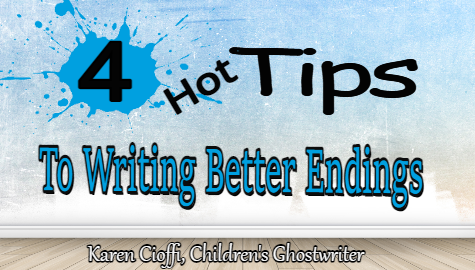Contributed by team member Suzanne Lieurance
Many writers have trouble coming up with the perfect ending for a story.
And the perfect ending is really important because it is often the ending of a story that people remember most.
That’s because a good ending ties everything together and leaves the reader feeling satisfied.
To write good story endings, keep these tips in mind:
1. A good ending is made possible by having a good beginning and a good middle.
If you’re having trouble with the ending of your story, go back and look at your beginning and middle.
What is the BIG thing your main character is trying to do or solve at the start of the story?
Is it clear throughout the story that your character is trying to solve this problem?
Everything in the beginning and middle of your story needs to relate to this problem.
When it does, it will be much easier to come up with the perfect ending.
If it doesn’t, you won’t be able to create the perfect ending to your story.
Try this: Write down, in one or two sentences, what the main conflict is in your story. If you have trouble doing this, you probably need to get clearer about the main story problem.
2. Your ending should come about because of the actions and events we see in the beginning and the middle of your story.
For example, don’t have some character we’ve never seen before suddenly appear at the end of the story to help the main character solve the problem or solve it for him.
This won’t make for a satisfying ending.
If you want to have another character help the main character at the end, we need to see this character in the middle of the story, not just the ending.
Also remember that the ending needs to come about because of action or actions the main character did or did not take.
Things can’t simply happen to the main character by chance.
And someone else can’t simply step in and save the day for your main character.
Things need to happen because of actions and decisions the main character makes throughout the story.
3. Make sure you have plenty of conflict (rising action) that leads to the climax and ending of the story.
Endings tend to fall flat if there isn’t plenty of conflict in the middle of the story, with all sorts of decisions and actions the main character faces before he’s able to solve or resolve the overall problem.
4. Good endings evoke some sort of emotion in the reader.
To write endings that do this, start by reading other published stories in the genre you wish to write.
See how they ended and how you felt at the ending.
Make a few notes about how the authors evoked these emotions.
You’ll have to practice writing endings that cause readers to feel emotions, so take your time.
When you have a clear problem that is evident throughout the story, and plenty of conflict throughout the story as the main character tries to solve this problem, it is much easier to create the perfect ending to your story – an ending that evokes emotion from your reader and leaves him feeling satisfied.
So follow these tips until you come up with an ending for your story that is just right!
Try it!
Suzanne Lieurance is a fulltime freelance writer, writing coach, certified life coach, and the author of over 30 published books. For more tips, resources, and other helpful information about writing and the business of writing, get your free subscription to The Morning Nudge at www.morningnudge.com.
 Whether you need rewriting or ghostwriting, let me take a look at your story. Just send me an email at: kcioffiventrice@gmail.com. Please put “Children’s Writing” in the Subject box.
Whether you need rewriting or ghostwriting, let me take a look at your story. Just send me an email at: kcioffiventrice@gmail.com. Please put “Children’s Writing” in the Subject box.
Or, give me a call at 347—834—6700
Let’s get your book in publishable shape today!

